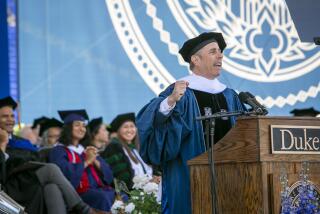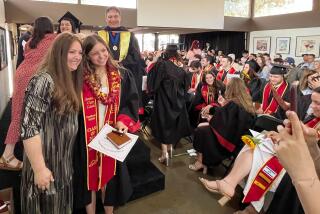Jill Abramson proves commencement talks are meant to be forgotten
- Share via
If ever there was a chance to give a rabble-rousing commencement speech devoid of forgettable platitudes, Jill Abramson had it. She declined.
Oh, she gave the speech, to the graduating class of Wake Forest University in North Carolina, on Monday. She just declined the chance to make it memorable. What was really striking, however, wasn’t that she avoided weighing in on the controversy that has swirled around her own career at the New York Times, which ended abruptly last week, but that she didn’t even mention the social and political upheavals in the very state where she was speaking. Those would have been worthy topics for her talk.
Abramson, as you may know, is the former executive editor of the New York Times. Her firing last week has occasioned an acrid debate over whether it reflected sexism at the top of the Times, her own incompetence as a manager or merely an outbreak of intrigue within the newspaper’s top ranks that would serve as a modern-dress staging of “Othello.”
Abramson has won the PR aspect of this affair thus far by staying home and keeping her mouth shut while her former boss, Times Publisher Arthur Sulzberger, prates on in public, sounding like a nincompoop.
So it’s not surprising that presented the opportunity via Monday’s speech to contribute to the record, Abramson passed. Because it was a commencement speech, the likelihood of her saying anything really memorable was slim.
As I observed last week -- in fact, on the very day Abramson’s firing was announced -- commencement speaking is a boondoggle in which the speakers get gobs of money or honorary degrees, or both, to toss verbal balls of yarn to a somnolent audience. (Abramson received an honorary doctorate; it’s not known if she also got cash.)
That’s why the argument about protests that have driven some controversial speakers off commencement podiums this year -- that we’ve been denied the chance to hear some really important insights -- falls so flat. Commencement speakers almost never have anything unique or important to say. They’re part of the decor, like the flowers on the speakers’ dais.
Abramson’s speech wasn’t bad, as commencement speeches go. It was brief, anyway. She started with a mildly disarming joke about how her notoriety brought a passel of news reporters to an event that otherwise would have been universally ignored: “I’m impressed that your achievements have attracted so much media attention,” she told the grads. She delivered a string of anecdotes about people who showed “resilience” -- the catch-all theme of the talk -- in the face of adversity great and small.
She offered empty but sincere-sounding compliments to the graduating class -- “What total knockouts you are” -- and closed by quoting a 1956 commencement speech by the poet Robert Frost that sounds like it set the gold standard for vacuity. “He described life after graduating as piece of knitting to go on with,” she said.
Yet, if you’re inviting the editor of the New York Times to be your graduation speaker, shouldn’t you expect something more? Under Abramson, the Times reported aggressively on North Carolina’s vicious campaign of voter suppression, built around what it quoted an expert saying was “the most sweeping anti-voter law in at least decades.” The state has refused to expand Medicaid under the Affordable Care Act, which will cost it millions of dollars and leave hundreds of thousands of residents uninsured.
Abramson could have addressed issues of sexism and pay discrimination in the workplace in her speech. But she didn’t need to dwell on issues related to her own travails to make it memorable. She could have talked about the racism and other forms of political and economic discrimination that have distinguished North Carolina and other Southern states in recent years. She could have exhorted her young audience to go forth and fight that wave, or at least recognize it for what it is -- in other words, to live up to her facile blessing of them as “knockouts.”
Oh, sorry. We almost forgot. This was a commencement speech, so that would never happen.
More to Read
Inside the business of entertainment
The Wide Shot brings you news, analysis and insights on everything from streaming wars to production — and what it all means for the future.
You may occasionally receive promotional content from the Los Angeles Times.











